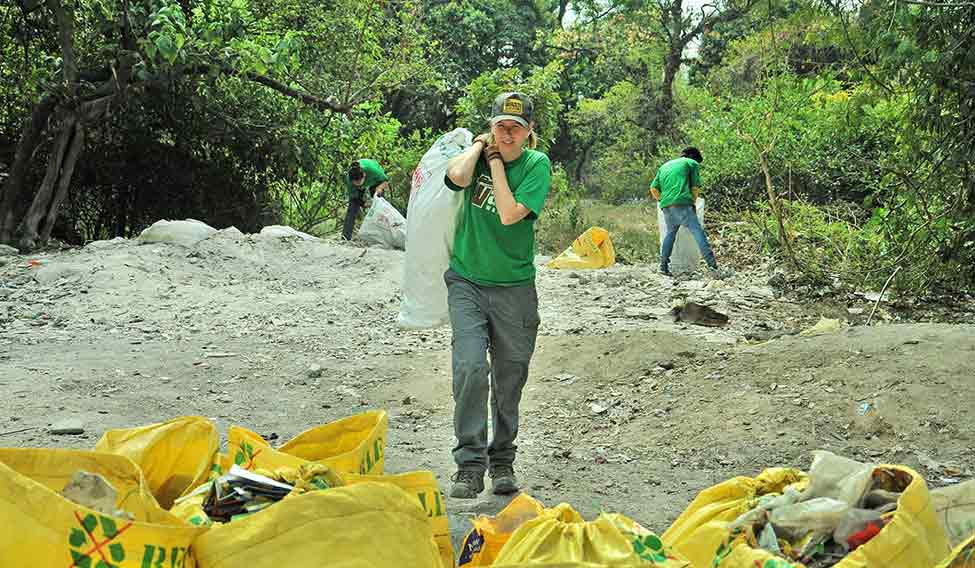Jodie Underhill was among the hundreds of British tourists who arrived in India in December 2008. She was eager to see what was so unique about Incredible India, and visited touristy destinations such as Mumbai, Goa, Karnataka, Kerala and Kanyakumari.
Jodie, then 32, was impressed... and depressed. She loved the exotic beauty of India, but loathed the way places were maintained. She just could not fathom the “open acceptance” of garbage in the country.
“I saw garbage everywhere on my entire trip,” she recalls. “Once, on a long train journey, I asked someone where I could dispose my trash, and, in the blink of an eye, he took it from me and flung it out of the window. I burst into tears. No one in the compartment could understand why I was so upset.”
In February 2009, Jodie, who had chosen “the school of life” over university education, reached the Tibetan Children’s Village in Dharamsala, where she had volunteered to conduct letter writing workshops for sponsorship secretaries. She was upset that Dharamsala’s pristine beauty was being marred by big mounds of garbage. And then she decided to do something about the menace.
“Que sera, sera (whatever will be, will be). I thought 'if it is my destiny, so be it',” says Jodie, whose father runs a construction company in Britain. “I did not choose garbage, it chose me! I realised then that I had found my life’s mission.”
Till then, Jodie lived a vagabond life. She would work, save and travel. “I worked as a fundraising assistant, coordinator for charities, receptionist, personal assistant and legal editor, to name a few jobs,” she says. “One might call me a rolling stone. Yes, I was one, but I had gathered a lot of moss. I realise all of those jobs gave me the skills needed to run an NGO.”
Jodie’s determination to take on garbage led to the formation of The Mountain Cleaners, a voluntary organisation that collected weekly waste from a remote mountain camp. More volunteers were recruited and asked to collect and segregate waste from tea shops, guest houses and hiking trails.
In September 2012, Jodie and her team headed to Dehradun. Thus was born Waste Warriors. Today, it is a well-organised NGO headed by Shanti Varma, an award-winning former principal of Welham Girls’ School.
Waste Warriors, which employs 60 full-timers, has done a remarkable job here in transforming and maintaining many commercial and residential localities. One hundred schools are now part of Waste Warriors’ environmental educational programme funded by Microsoft. It also holds regular clean-up drives, waste management programmes and awareness campaigns.
Much of its funding comes from corporate partners such as Mahindra & Mahindra, Microsoft, Nokia, Sud-Chemie and Globus Spirits. It recently received funding from the Thapar Charitable Public Trust, too, for education and awareness projects among the youth.
The latest mission of Waste Warriors is in the Jim Corbett National Park in Nainital district. Mahindra & Mahindra sponsored the project, and donated two Boleros—one for Dehradun and the other for Corbett.
“Waste Warriors is doing commendable work,” says Anand Mahindra, chairman of Mahindra & Mahindra. “The Mahindra group is proud to support their efforts in Dehradun and Corbett, and I hope that other cities learn from their experience and embrace sustainable, holistic and community driven approaches to waste disposal.”
Actor Aamir Khan is another high-profile supporter of Waste Warriors. He apparently had a 90-minute discussion with Jodie in Mumbai in July last year.
“I am genuinely happy about the wonderful work that Waste Warriors is doing, and I wish them all the very best in the mammoth task they have undertaken,” says Khan. “It amazes me that a person from outside India is so concerned about cleaning India.”
Talking of clean India, what's Jodie's take on the lacklustre progress of Prime Minister Narendra Modi’s Swachh Bharat Abhiyan? “The cleaning up of the vast country is not a task just for the prime minister,” she says. “The entire government machinery and each person in the country has to do one's bit.”
Many people believe there is no point cleaning a public place, as it would get dirty again, says Jodie. “This mindset has to change,” she adds. “I ask people, 'Don't we clean our homes and maintain our personal hygiene every day?’”
Rules have to be tougher, she says. “In the west, we promptly segregate our waste not because we are all good citizens but to save ourselves from the fines,” she chuckles. “Waste management and environmental conservation should be made part of the school curriculum. I would also like to see an environment tax on products with non-recyclable packaging and that money should be used for waste disposal and recycling. The public works departments should use low-micron, non-recyclable plastic for constructing roads, as it has been proven that it makes them stronger. This is one of our upcoming initiatives in Doon.”
Jodie is so wedded to her cause that she has “no intentions” about marriage. “There are so many things I want to achieve with Waste Warriors and I don’t want anything to get in the way of that,” she says.
Shanti Varma is all praise for Jodie’s commitment. “I have rarely met anyone with such dedication. Jodie works tirelessly in conditions that are often bleak and insalubrious. I am proud to be associated with her,” she says.
Waste Warriors provides Jodie accommodation, meals and visa fees, and she is more than happy with that. In June last year, Jodie visited her home in England after two and a half years. Doesn't she want to return home? “No,” she says. “India is home.”












